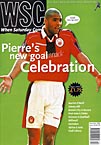 Call yourself a real football fan? If so, Ian Plenderleith would like a word
Call yourself a real football fan? If so, Ian Plenderleith would like a word
I used to live with an Arsenal fan. He knew sod all about football and had only started going to watch them in the mid-1980s because that’s what all the people he met at college did on Saturday afternoon. When Arsenal won the Cup-Winners Cup in 1994 he told everyone that Arsenal had won “the European Cup”. And asked to name his current England XI he put down Niall Quinn. On the left wing.
Laughs all round at his expense, then, but the thing was he didn’t care. It wasn’t that important to him that he could not name any players from the 1970s or that he couldn’t keep up with a conversation in the pub where the rest of the circle were comparing knee scars from falls on jagged terracing at the age of six.
But for those with a more fundamentalist view on the role of football, genuine-fan credentials seem to have become – to borrow a phrase employed by commentators to describe every game broadcast live on TV – absolutely essential in the age of Skyperbole. For it would seem that a despicable new breed, seduced by the appeal of having a satellite dish on the side of their house and, perish the thought, buying a replica shirt, is now ruining the game for everybody.
For many fans the identikit lounge-layabout seems to have become the epitome of evil and a tool by which they now measure their own credibility. So those wry, nostalgic conversations of ten years ago about sideburns, flares and flick-knives (which went on to constitute 50 per cent of fifth-rate, sub-Loaded glossy football magazine journalism in the Nineties) have been replaced by chest-out proclamations starting with those ominous words: “In the 25 years that I’ve been watching football…”
Those of us who have been watching football longest, you see, believe that we own the game. The further back your initiation, the greater your moral entitlement to pontificate on the latecomers who spent their youths unaware of the world-shaking importance of events taking place within Blundell Park and Plainmoor. Worse still, somewhere along the way we lost our sense of humour and became like the indie-pop clan, those gloomy guardians of hip who berate the vacuity of the pop charts, but who then huff and puff when their favourite band gets famous: “It’s not fair, I liked James years ago when they were on Factory and no one had ever heard of them.” What did they want – compensation or cultural copyright?
Of course it is a wonderful thing that fans have found their voices over the past few years, that supporters’ associations have gained respect in the media and are consulted and quoted by the great and powerful, and that Brigg Town boasts eight independent fans’ magazines. The question is, however, do football fans really have much more worth saying now they seem to spend so much time harping on about the remote control addicts, supposedly killing football in their living rooms? (Real football fans, as well as having supported their local side from the womb, have never ever watched a game on Sky.)
A reflection of this trend is the fact there are now only three jokes left in football: all Man United fans live down south; all Scottish goalies are rubbish; the Arsenal back four likes to step up with its collective arm in the air.
These have all been repeated so often that no one has noticed they are not even slightly funny any more, illustrating once more that the game as a whole has become too important to too many people. Have you read a fanzine lately? Was it funny or did it call your striker a leg iron and your local rivals scum? What about a witty terrace chant (of course not, it’s been scientifically proven that sitting down paralyses the vocal chords)? Have you talked to a fellow fan lately? What did you moan about first, the chairman’s failure to spend 20 million quid on new players or the imminent death of the game?
Watching your football team should mean one and a half hours of oscillation between tension, dread, despair and ecstasy. It doesn’t matter if you watched your first game last week or last century, if you watched it on your arse at home or off your head on the terrace – if you go through these emotions then you’re involved. Only, once that game is over, it would be nice to go back to the days when we didn’t take it all quite so seriously and supporting a foot- ball team wasn’t a crutch for the socially challenged.
From WSC 142 December 1998. What was happening this month